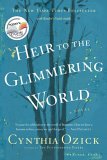Summary | Excerpt | Reading Guide | Reviews | Beyond the Book | Readalikes | Genres & Themes | Author Bio

Critics' Opinion:
Readers' Opinion:
First Published:
Sep 2004, 320 pages
Paperback:
Sep 2005, 320 pages
 Book Reviewed by:
Book Reviewed by:
BookBrowse Review Team
Buy This Book
Chapter 1
In 1935, when I was just eighteen, I entered the household of Rudolf Mitwisser, the scholar of Karaism. "The scholar of Karaism"— at that time I had no idea what that meant, or why it should be "the" instead of "a," or who Rudolf Mitwisser was. I understood only that he was the father of what seemed to be numerous children, and that he had come from Germany two years before. I knew these things from an advertisement in the Albany Star:
Professor, arrived 1933 Berlin, children 3–14,
requires assistant, relocate NYC. Respond
Mitwisser, 22 Westerley.
It read like a telegram; Professor Mitwisser, I would soon learn, was parsimonious. The ad did not mention Elsa, his wife. Possibly he had forgotten about her.
In my letter of reply I said that I would be willing to go to New York, though it was not clear from the notice in the Star what sort of assistance was needed. Since the ad had included the age of a very young child, was it a nanny that was desired? I said I would be pleased to take on the job of nanny.
It was Elsa, not Mitwisser, who initiated the interview—though, as it turned out, she was not in charge of it. In that family she was in charge of little enough. I rode the bus to a corner populated by a cluster of small shabby stores—grocery, shoemaker's, dry cleaner's, and under a tattered awning a dim coffee shop vomiting out odors of some foul stuff frying.
The windows of all these establishments were impenetrably dirty. Across the street a deserted gas station had long ago gone out of business: several large dogs scrabbled over the oil-blackened pavement and lifted their hind legs against the rusting pumps.
The address in the ad drew me along narrow old sidewalks fronting narrow old houses in what I had come to think of as the Albany style: part Hudson Gothic, part Dutch settler. But mainly old. There were bowshaped stained-glass insets over all the doors. The lamps in the rooms behind them, glowing violet and amber through the lead-bordered segments of colored panes, shut me out. I thought of underground creatures kept from the light. It was November, getting on to an early dusk.
Frau Mitwisser led me into a tiny parlor so dark that it took some time before her face, small and timid as a vole's, glimmered into focus.
"Forgive me," she began, "Rudi wishes not the waste of electricity. We have not so much money. We cannot pay much. Food and a bed and not so many dollars." She stopped; her eyelids looked swollen. "The tutor for my sons, it was you see . . . charity. Also the beds, the linens—"
She was all apology: the slope of her shoulders, her fidgety hands twittering around her mouth, or reaching into the air for a phantom rope to haul her out of sight. Helplessly but somehow also slyly, she was reversing our mutual obligation—she appealing for my sympathy, I with the power to withhold it. It was hard to take in those pursed umlauts sprinkled through her vowels, and the throaty burr of her voice was lanced by pricks so sharp that I pulled back a little. She saw this and instantly begged my pardon.
"Forgive me," she said again. "It gives much dif?culty with my accent. At my age to change the language is not so simple. You will see with my husband the very great difference. In his youth for four years he studies at Cambridge University in England, he becomes like an Englishman. You will see. But I . . . I do not have the — wie nennt man das?—the idiom."
Her last word was shattered by an enormous thud above our heads. I looked up: was the ceiling about to fall in on us? A second thud. A third.
"The big ones," Frau Mitwisser said. "They make a game, to jump from the top of the . . . Kleiderschrank, how you call this? I tell them every day no, but anyhow they jump."
This is the complete text of chapter 1, pages 1-5 of Heir to the Glimmering World by Cynthia Ozick. Copyright 2004 by Cynthia Ozick. All rights reserved.




Analyzing humor is like dissecting a frog. Few people are interested and the frog dies of it.
Click Here to find out who said this, as well as discovering other famous literary quotes!
Your guide toexceptional books
BookBrowse seeks out and recommends the best in contemporary fiction and nonfiction—books that not only engage and entertain but also deepen our understanding of ourselves and the world around us.